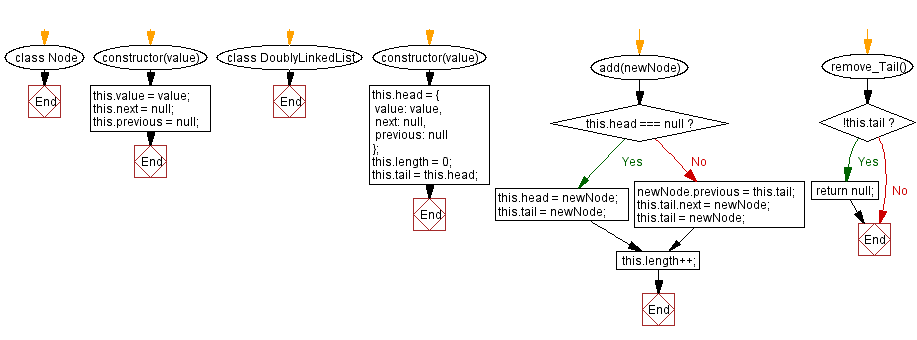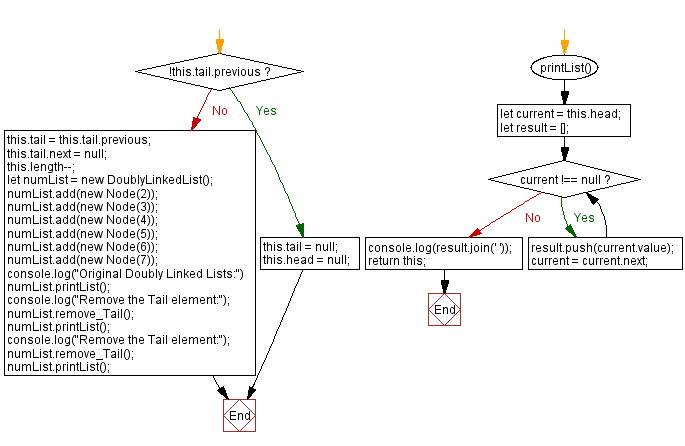JavaScript Exercises: Remove the tail element from a doubly Linked lists
JavaScript Data Structures: Exercise-16 with Solution
Remove the tail element from a DLL
Write a JavaScript program that removes the tail element from a doubly Linked lists.
Sample Solution:
JavaScript Code:
class Node {
// Constructor function for creating a new node with a given value
constructor(value) {
this.value = value; // Assign the given value to the node
this.next = null; // Initialize the pointer to the next node as null
this.previous = null; // Initialize the pointer to the previous node as null
}
}
class DoublyLinkedList {
// Constructor function for creating a new doubly linked list with a head node having the given value
constructor(value) {
// Initialize the head node with the given value and no next or previous node
this.head = {
value: value, // Store the value of the head node
next: null, // Pointer to the next node in the list, initially set to null
previous: null // Pointer to the previous node in the list, initially set to null
};
this.length = 0; // Initialize the length of the list to 0
this.tail = this.head; // Set the tail node to the head node initially
}
add(newNode) {
if (this.head === null) { // If the list is empty
this.head = newNode; // Set the new node as both head and tail
this.tail = newNode;
}
else
{
newNode.previous = this.tail; // Set the previous pointer of the new node to the current tail node
this.tail.next = newNode; // Set the next pointer of the current tail node to the new node
this.tail = newNode; // Update the tail node to the new node
}
this.length++; // Increment the length of the list
}
remove_Tail() {
if (!this.tail) { // If the list is empty, return null
return null;
}
if (!this.tail.previous) { // If there is only one node in the list
this.tail = null; // Set tail to null
this.head = null; // Also set head to null
return;
}
this.tail = this.tail.previous; // Update the tail to the previous node
this.tail.next = null; // Set the next pointer of the new tail to null
this.length--; // Decrement the length of the list
}
printList(){
let current = this.head; // Start from the head of the list
let result = []; // Array to store the values of the nodes
while (current !== null) { // Iterate through the list until reaching the end
result.push(current.value); // Push the value of the current node to the array
current = current.next; // Move to the next node
}
console.log(result.join(' ')); // Log the values of the nodes separated by space
return this; // Return the DoublyLinkedList object for chaining
}
}
let numList = new DoublyLinkedList(); // Create a new instance of the DoublyLinkedList class
numList.add(new Node(2)); // Add nodes to the list
numList.add(new Node(3));
numList.add(new Node(4));
numList.add(new Node(5));
numList.add(new Node(6));
numList.add(new Node(7));
console.log("Original Doubly Linked Lists:"); // Print the original list
numList.printList();
console.log("Remove the Tail element:"); // Remove the tail element
numList.remove_Tail();
numList.printList();
console.log("Remove the Tail element:"); // Remove the tail element again
numList.remove_Tail();
numList.printList();
Output:
Original Doubly Linked Lists: 2 3 4 5 6 7 Remove the Tail element: 2 3 4 5 6 Remove the Tail element: 2 3 4 5
Flowchart:


Live Demo:
See the Pen javascript-doubly-linked-list-exercise-16 by w3resource (@w3resource) on CodePen.
For more Practice: Solve these Related Problems:
- Write a JavaScript function that removes the tail node from a doubly linked list and updates the tail pointer accordingly.
- Write a JavaScript function that traverses backward from the tail to remove the last node and maintain list integrity.
- Write a JavaScript function that handles edge cases when the DLL contains only one node during tail removal.
- Write a JavaScript function that removes the tail element and returns the updated doubly linked list structure.
Go to:
PREV : Remove the head element from a DLL.
NEXT : Update the value of a node at a specific index in a DLL.
Improve this sample solution and post your code through Disqus
What is the difficulty level of this exercise?
Test your Programming skills with w3resource's quiz.
